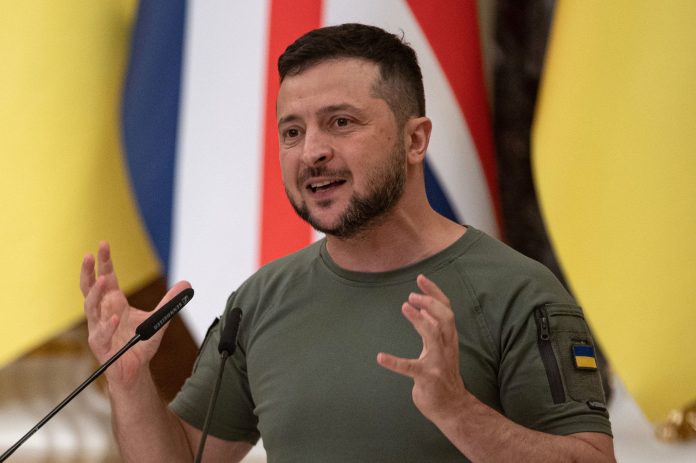
Ukrainian President Volodymyr Zelenskyy is hopeful that allies will adopt a more favorable view of his “victory plan” after the upcoming U.S. election, although he acknowledges that some major Western partners, particularly Germany, remain hesitant about Ukraine’s NATO membership.
Zelenskyy noted that Russia is also monitoring the U.S. election outcome to gauge the potential for cease-fire negotiations with Ukraine.
He suggested that reaching partial cease-fire agreements regarding energy infrastructure and Black Sea shipping could indicate the conclusion of the conflict’s “hot phase.”
Speaking to reporters on Monday, his remarks were embargoed until Tuesday.
He indicated that the U.S. is currently reviewing his plan but does not anticipate any significant feedback until after the November 5 election.
“They mentioned that they have begun analyzing the Victory Plan and are considering various aspects. However, it’s clear to me that all major partners, especially during the election period, are wary of Russia’s possible reactions,” he said. “They realize that this package could be a game changer for them.”
Regarding NATO, Zelenskyy pointed out that France, Britain, and Italy have shown support, but Germany remains cautious. He believes that only a definitive U.S. endorsement would sway Berlin’s stance.
“The reality is that the German government is skeptical about our NATO membership—this is a fact. However, their position is somewhat softer than before, which is also true.
“But when it comes to the invitation I’m discussing now, they are concerned about Russia’s response,” he added.
Zelenskyy emphasized that Germany’s position could be influenced by a broader coalition of support, particularly a strong “Yes” from the United States.
Many crucial decisions will depend on the aftermath of the tense election period, according to the president.
“After the elections, we hope for a more favorable response from the U.S.—not due to a change in the presidency, but because the U.S. is currently focused on the elections. I believe any sharp statements from them at this time could be seen as inappropriate or risky. They likely want to avoid unnecessary complications,” he said.
When asked if he feels pressure from allies to bring an end to the war, Zelenskyy humorously remarked, “Over the years, people’s overall blood pressure has risen.”
He dismissed rumors about a possible cease-fire deal that would involve Ukraine trading occupied territories for NATO membership.
“We are not discussing this. However, I believe these media leaks are not coincidental. Some partners may entertain such thoughts but don’t communicate them directly to me; instead, they test the waters through the media.”
He stated that the end of the “hot phase” of the war would begin if a deal could be reached with Russia to cease attacks on energy facilities and Black Sea ports and shipping routes. Nonetheless, he mentioned that military operations would still continue against military targets and along the front lines.
Zelenskyy also aims to persuade countries in the Global South to support Ukraine’s plan as a means to compel Moscow to accept Kyiv’s terms.
He clarified that Ukraine is not seeking nuclear weapons to deter Russian President Vladimir Putin.
“We are not asking for nuclear weapons to be provided or returned to us. My position is straightforward: we gave them up, but received nothing in return. Instead, we faced a full-scale war and significant casualties. Therefore, we have only one option left, which is why we need NATO; we lack the weapons necessary to stop Putin.”











